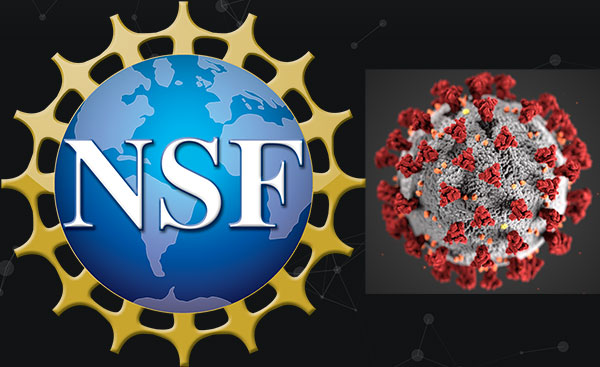UIUC researchers awarded NSF grant to track misinformation on COVID-19

Last fall, a group of University of Illinois professors from across campus created a research project to study misinformation about health practices. In the spring, however, they shifted their focus to COVID-19 misinformation, a timely study that essentially would indicate that the Internet “really isn't an arbiter of truth,” among other goals. This summer, the group was awarded a $150,000 RAPID grant by the National Science Foundation to continue this research.
The project, "Tracking and Network Analysis of the Spread of Misinformation Regarding COVID-19,” seeks to understand how misinformation surrounding the COVID-19 pandemic spreads through social media outlets such as Twitter, Facebook, Reddit, and Instagram, using machine learning and network analysis tools.
The researchers define misinformation as information that intends to mislead the public and is created for the purpose of sowing doubt in science and established institutions.
The research group is led by PI Kevin Leicht, professor in the Department of Sociology; Co-PI Brant Houston, Knight Chair Professor in Investigative and Enterprise Reporting in the Department of Journalism; Co-PI Joseph Yun, research assistant professor in the Gies College of Business and the Charles H. Sandage Department of Advertising; and Loretta Auvil, senior project coordinator at the National Center for Supercomputing Applications (NCSA).
Leicht said the group started with an NCSA fellowship to track health-related misinformation on vaccinations, cancer cures, HIV treatments, and sexual health. Since the research project was already set up to track health misinformation, they switched their focus to COVID-19 when the pandemic hit.
“I have been working on research using social media data, as well as building out research technology for social media data, for years now,” Yun said. “When I was introduced to Kevin, Brant, and Loretta, we felt like all of our different skills and talents could come together to make an attempt to address this issue.”
A longstanding example of the misinformation they are researching includes memes that suggest that masks don't prevent transmission of the COVID-19 virus. Such misinformation, Leicht said, tends to originate among individuals and organizations who believe that wearing a mask is a constraint on their civil liberties, and that the COVID-19 pandemic is a “conspiracy to discredit the Trump administration.”
“But it is difficult to tell at this point if the misinformation starts with these groups or if these groups just pick up misinformation spread by others and just amplify it,” he said.
The second, more recent piece of misinformation was the claim that COVID-19 only killed around 9,000 Americans, with the remaining fatalities succumbing to pre-existing conditions. “The precise origins of that rumor are still up in the air," Leicht said.
Auvil said with the vast amount of data about COVID-19 making its way around the Internet, it is difficult to know what is true and factual. For this reason, the team hopes their work will help identify misinformation.
The researchers pointed out the gravity of COVID-19 misinformation, which can lead to illness or death.
“People can expose themselves much more frequently and dangerously to the virus and infect others,” Houston said. “They also can try out medications that are not only unsuitable as treatment, but can injure or kill them. In addition, this misinformation undermines citizens' trust in science and the possible solutions to this pandemic, and politicizes this lethal pandemic.”
Yun said there are probably many harmful effects that can occur, but he is most concerned about the loss of lives due to individuals and groups believing in the misinformation that exists.
“The news media are now full of stories of regret from people who either became very sick or had relatives die, when either the relative or the interviewee didn't believe COVID was serious, [believing] ‘it's like the flu,’ ‘it only affects people with pre-existing conditions,’ ‘masks make COVID worse,’ etc.,” Leicht said. “There are no stories of people who claim they took precautions and they regretted it, probably because there is very little regret to report.”
There are two benefits that he hopes come from the group’s research: first, that social media companies, and those that study and watch over them, are in a better position to track the spread of misinformation and stop it before it spreads; and, second, that the public learns how to detect misinformation.
“Through these efforts, I hope that the public can gain a better understanding of what is going on with regards to COVID-19 misinformation as well as have access to tools that they can use to identify and filter misinformation,” Yun said.
For the present time, Yun thinks their research will hopefully help with the current issue of COVID-19 misinformation, but for the future, he hopes that their research will be part of the foundation for dealing with misinformation overall on the Internet.
“Yes, this is a big goal, but we are just one piece of the larger research community working on this,” he said.
—Kimberly Belser, Communications and Marketing Intern
